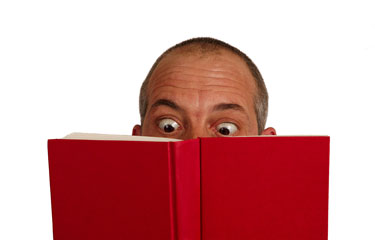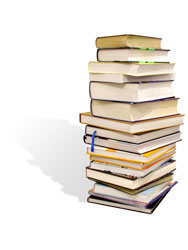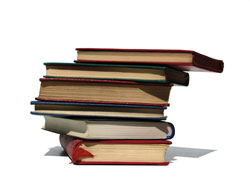Summer reading recommendations from TCNJ’s English department
In addition to literary scholars and critics, the faculty in the Department of English includes poets, novelists, biographers, professional writers, and journalists. So who better to ask to recommend a good book to read?

In addition to literary scholars and critics, the faculty in the Department of English includes poets, novelists, biographers, and professional writers. So who better to recommend a good book for you to read this summer?
Piper Kendrix Williams
Daniel Sharfstein’s The Invisible Line: Three American Families and the Secret Journey from Black to White—a great read and fascinating study of the complexity around how race defines us and how we all may be more “mixed raced” than we know.
Jess Row
Debt, by David Graeber. Graeber is one of the intellectual forces behind the Occupy movement, and this book offers a radical and new political economy centered on the forgiveness of debts.
Kim Pearson
William Jelani Cobb’s The Devil and Dave Chappelle and Michelle Alexandar’s The New Jim Crow.
Jo Carney
Wells Tower’s Everything Ravaged, Everything Burned (witty, off-kilter, great sentences); Yiyun Lee, Gold Girl, Emerald Boy (lyrical, poignant, great sentences); and Jess Row’s Nobody Ever Gets Lost (smart, moving, great sentences).
Emilie Lounsberry
 I recommend Five Chiefs, the Supreme Court memoir written by retired Justice John Paul Stevens. It is an intriguing behind-the-scenes look at the nation’s highest court, with Stevens, the third longest-serving justice, recounting his experiences with the five chief justices who served during his tenure. While so much of cable punditry offers a political perspective of the court, Stevens sticks to the legal perspective. While that might at times seem a bit dry, it is refreshing to read that the rule of law is still what governs the third branch. Stevens describes how he disagreed with the decision to hear the epic Bush v. Gore case, and ultimately came to conclude that the death penalty is pointless. On a lighter note, he also recounts how one justice used to answer the phone, “Joe’s Bar.”
I recommend Five Chiefs, the Supreme Court memoir written by retired Justice John Paul Stevens. It is an intriguing behind-the-scenes look at the nation’s highest court, with Stevens, the third longest-serving justice, recounting his experiences with the five chief justices who served during his tenure. While so much of cable punditry offers a political perspective of the court, Stevens sticks to the legal perspective. While that might at times seem a bit dry, it is refreshing to read that the rule of law is still what governs the third branch. Stevens describes how he disagreed with the decision to hear the epic Bush v. Gore case, and ultimately came to conclude that the death penalty is pointless. On a lighter note, he also recounts how one justice used to answer the phone, “Joe’s Bar.”
David Blake
In addition to keeping up with some of our visiting writers (thanks to INK for introducing me to Ben Marcus’ novel The Flame Alphabet), I’ve been playing a lot of catch-up this year. Although I didn’t know it at the time, two German novels with an interest in Walt Whitman took center stage: Thomas Mann’s Death in Venice and Hermann Hesse’s Steppenwolf. Though they may sound as dry and faded as the pages of an old paperback, these novels are wild, trippy, and mesmerizing reads.
Michele Tarter
I’ve read some really interesting books this year. One of my favorites is The Physick Book of Deliverance Dane, written by Katherine Howe (who is a descendant of one of the victims of the Salem witch hunt). Two other great books that I highly recommend are A Discovery of Witches by Deborah E. Harkness and Angelology by Danielle Trussoni. Most recently, I’ve delved into the historical fiction of the Tudor period. It started when a student recommended to me The Wise Woman by Philippa Gregory. Since that time, I’ve read nearly every book written by that author (who is a historian and professor in England), and my favorites are The Queen’s Fool, The Boleyn Inheritance, The Lady of the Rivers, and Virgin Earth.
Lincoln Konkle
Fool by Christopher Moore (King Lear retold from the point of view of the Fool; X-rated for sex, violence, and cursing—all hilarious); The Enchantress of Florence by Salman Rushdie (story upon story upon story within story within story within—like he was trying to top 1001 Tales of the Arabian Nights); Cloud Atlas by David Mitchell (again, multiple stories, but each in a different genre and time period).
Jean Graham
We Is Got Him by Carrie Hagen, a 2003 graduate of our MA program. It’s a nonfiction account of a 19th-century kidnapping in Philadelphia, the first in the U.S. for ransom.
Michael Robertson
The first two parts of Margaret Atwood’s MaddAddam trilogy, Oryx and Crake and The Year of the Flood. Atwood is perhaps best known for her brilliant and disturbing dystopian novel The Handmaid’s Tale; these two MaddAddam novels are equally dystopian but even more brilliant and disturbing. The books, set in the future just before and after a biological apocalypse devastates the earth, are speculative fiction at its finest—wildly inventive novels that not only tell completely absorbing stories but that probe the most serious issues facing our society. Atwood is not just one of our greatest living writers; she’s one of our greatest thinkers. Once you’ve read these two novels, you’ll be among the many readers eagerly waiting for the trilogy’s final installment.
Emily Meixner
 Seeing as how I may not be able to assign The Hunger Games in LIT 310 [Literature for Young Readers] anymore because nearly everyone in the world has already read it, I’ve been on the lookout for another engrossing YA dystopian/science fiction option. I think I’ve found it in Veronica Roth’s Divergent. Here’s what I liked: a strong, capable female protagonist, a re-worked Chicago landscape set at some point in the future, a society organized into groups that all serve a specific function, a possible love interest, occasional breathtaking violence, and (like The Hunger Games) Divergent is the first book in a trilogy.
Seeing as how I may not be able to assign The Hunger Games in LIT 310 [Literature for Young Readers] anymore because nearly everyone in the world has already read it, I’ve been on the lookout for another engrossing YA dystopian/science fiction option. I think I’ve found it in Veronica Roth’s Divergent. Here’s what I liked: a strong, capable female protagonist, a re-worked Chicago landscape set at some point in the future, a society organized into groups that all serve a specific function, a possible love interest, occasional breathtaking violence, and (like The Hunger Games) Divergent is the first book in a trilogy.
Ellen Friedman
Nathan Englander, What We Talk About When We Talk About Anne Frank. A brilliant short story collection, Englander’s second, in the tradition of Sholom Aleichem. Full of wisdom, humor, and irony. I’d also recommend Adam Johnson, The Orphan Master’s Son. A frightening book about North Korea based on Johnson’s research in that country. It depicts a society that is completely state controlled and in which even parents and children are afraid of being reported by one another for slight infractions.
Catie Rosemurgy
Timothy Donnelly’s The Cloud Corporation
Glenn Steinberg
Andrea Wulf, Founding Gardeners: The Revolutionary Generation, Nature, and the Shaping of the American Nation. This book sheds a somewhat different light on the founding fathers of our nation from the customary one. In doing so, it clarifies much about the revolutionary generation that has been misrepresented in the political discourse of recent elections in the United States.
Felicia Steele
For Non-Fiction, Michael Erard, Babel No More. Michael’s a friend from graduate school who has become a journalist focused on language. This book explores hyperpolyglots—people who learn extraordinary numbers of languages. It’s a wonderful exploration of the possibilities of the human brain. For Fiction, Sir Walter Scott, The Antiquarian. I’ve been working through “the classics,” and this book has always been on my list, partially because I admire the English antiquarians. Strangely enough, the Antiquarian actually has very little to do with the plot.
Larry McCauley
State of Wonder by Anne Patchett: In some ways a contemporary version of Heart of Darkness (but with a much more effectively realized jungle). I found this novel engaging from an ecological/ethical point of view and also liked that it has a real plot.
Crooked Letter, Crooked Letter by Tom Franklin: This was recommended to me as “crime fiction,” but I found in it a powerful tale of betrayal, murder, and racial tension. I also found the atmosphere of rural poverty and small-town life to be spot on. Finally, one of the main characters is locally known as “Crazy Larry” and for some reason that appealed to me.
Jia-Yan Mi
Charlie Chan: The Untold Story of the Honorable Detective and His Rendezvous with American History by Yunte Huang. Described as a “heady mixture of scholarship, essay and memoir” (Washington Post), Charlie Chan energetically deconstructs the social and cultural milieu of the fictional detective as it examines the people and events that contributed to his popularity. Critics praised Huang’s extensive research, careful analysis, and his willingness to use his own experiences as a Chinese immigrant to examine racism, exploitation, and assimilation–a deeply personal but surprisingly cheerful journey into his past. As provocative as it is engaging, Charlie Chan will captivate fans of all genres.
Already read everything listed here? Then click over to the department website to find out what these professors will be reading next.
Posted on June 11, 2012

